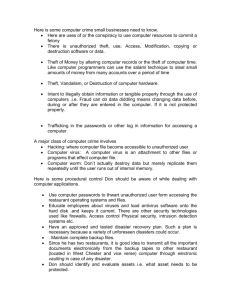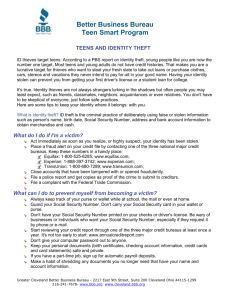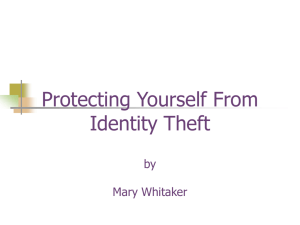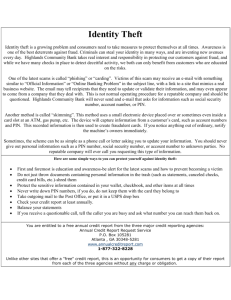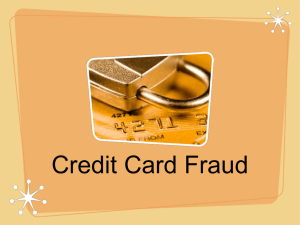What is Identity Theft?
advertisement
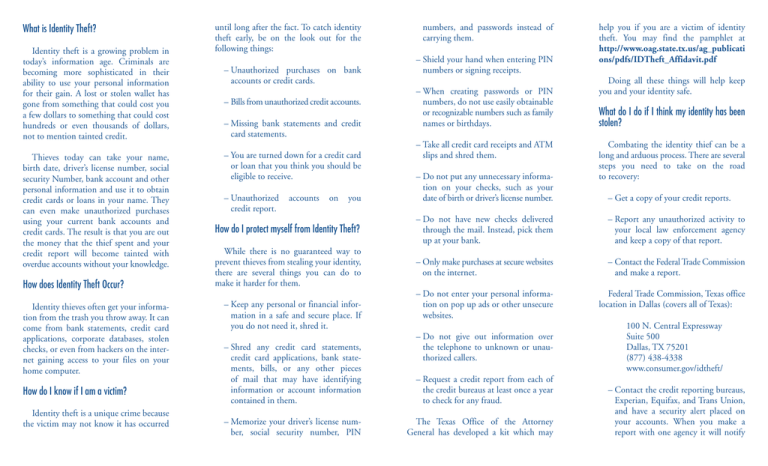
What is Identity Theft? Identity theft is a growing problem in today’s information age. Criminals are becoming more sophisticated in their ability to use your personal information for their gain. A lost or stolen wallet has gone from something that could cost you a few dollars to something that could cost hundreds or even thousands of dollars, not to mention tainted credit. Thieves today can take your name, birth date, driver’s license number, social security Number, bank account and other personal information and use it to obtain credit cards or loans in your name. They can even make unauthorized purchases using your current bank accounts and credit cards. The result is that you are out the money that the thief spent and your credit report will become tainted with overdue accounts without your knowledge. How does Identity Theft Occur? Identity thieves often get your information from the trash you throw away. It can come from bank statements, credit card applications, corporate databases, stolen checks, or even from hackers on the internet gaining access to your files on your home computer. How do I know if I am a victim? Identity theft is a unique crime because the victim may not know it has occurred until long after the fact. To catch identity theft early, be on the look out for the following things: – Unauthorized purchases on bank accounts or credit cards. – Bills from unauthorized credit accounts. – Missing bank statements and credit card statements. – You are turned down for a credit card or loan that you think you should be eligible to receive. – Unauthorized credit report. accounts on you numbers, and passwords instead of carrying them. – Shield your hand when entering PIN numbers or signing receipts. – When creating passwords or PIN numbers, do not use easily obtainable or recognizable numbers such as family names or birthdays. – Take all credit card receipts and ATM slips and shred them. – Do not put any unnecessary information on your checks, such as your date of birth or driver’s license number. help you if you are a victim of identity theft. You may find the pamphlet at http://www.oag.state.tx.us/ag_publicati ons/pdfs/IDTheft_Affidavit.pdf Doing all these things will help keep you and your identity safe. What do I do if I think my identity has been stolen? Combating the identity thief can be a long and arduous process. There are several steps you need to take on the road to recovery: – Get a copy of your credit reports. How do I protect myself from Identity Theft? – Do not have new checks delivered through the mail. Instead, pick them up at your bank. – Report any unauthorized activity to your local law enforcement agency and keep a copy of that report. While there is no guaranteed way to prevent thieves from stealing your identity, there are several things you can do to make it harder for them. – Only make purchases at secure websites on the internet. – Contact the Federal Trade Commission and make a report. – Do not enter your personal information on pop up ads or other unsecure websites. Federal Trade Commission, Texas office location in Dallas (covers all of Texas): – Keep any personal or financial information in a safe and secure place. If you do not need it, shred it. – Shred any credit card statements, credit card applications, bank statements, bills, or any other pieces of mail that may have identifying information or account information contained in them. – Memorize your driver’s license number, social security number, PIN – Do not give out information over the telephone to unknown or unauthorized callers. – Request a credit report from each of the credit bureaus at least once a year to check for any fraud. The Texas Office of the Attorney General has developed a kit which may 100 N. Central Expressway Suite 500 Dallas, TX 75201 (877) 438-4338 www.consumer.gov/idtheft/ – Contact the credit reporting bureaus, Experian, Equifax, and Trans Union, and have a security alert placed on your accounts. When you make a report with one agency it will notify the others and they will all put a security alert on your account. EXPERIAN P. O. Box 2104 Allen, TX 75013 - 2104 www.experian.com (888) 397-3742 EQUIFAX P. O. Box 740241 Atlanta, GA 30374 - 0241 www.equifax.com (800) 685-1111 (order report) (800) 525-6285 (report fraud) TRANS UNION P .O. Box 2000 Chester, PA 19022 - 2000 www.transunion.com (800) 888-4213 (request report) (800) 680-7289 (report fraud) What laws are in place to punish identity thieves ? The federal and state legislatures have enacted several laws to punish those who commit identity theft and also help deter future violations. Texas has two major statutes which deal with identity theft. Texas Penal Code, Section 32.51 makes identity theft punishable as a felony and also gives the court the option to order restitution to the victim. Furthermore, Texas has enacted the Identity Theft Enforcement and Protection Act which among others imposes a duty on businesses to protect and safeguard sensitive personal information. The Texas Attorney General can pursue legal action against those businesses who fail to comply with the Act. Prepared as a Public Ser vice by the Texas Yo ung Lawyers Associatio n and Distributed by the State Bar o f Texas For Additional Copies Please Contact: Public Info rmation Department State Bar of Texas P.O. Box 12487 Austin, Texas 78711-2487 (800) 204-2222, Ext. 1800 www.texasbar.com – Contact the financial institutions holding the unauthorized accounts and have them canceled. – Contact your banks and financial institutions to notify them of the problem and request a new account. – Cancel any credit or debit cards and ask for replacements. www.tyla.org – Put a “stop payment” on any missing checks. 3 6 01 0 04 /0 8 IDENTITY THEFT
